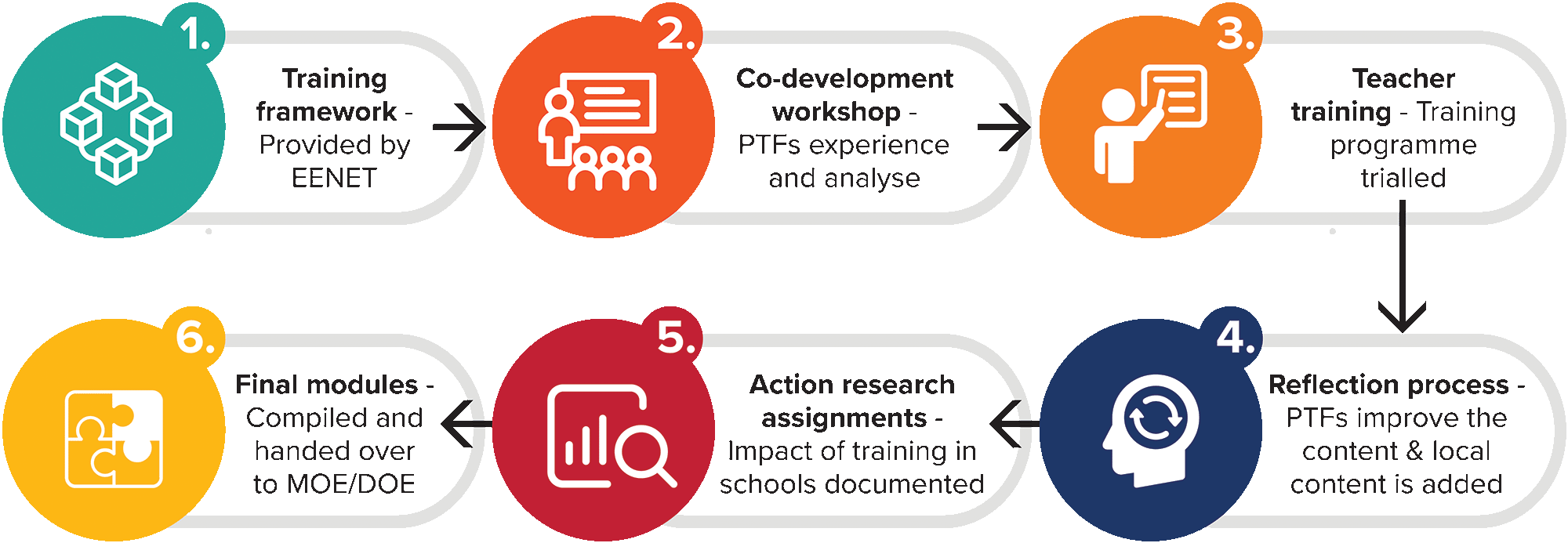Karen Khayat and Emma Shepherdson
Since 2015 EENET has worked with Norwegian Association of Disabled and partners and ministries of education in Zambia and Zanzibar to develop comprehensive teacher training on inclusive education. The training modules were shared under a Creative Commons license, so anyone can use and adapt them for their own context. A programme in Duhok, in the Kurdish region of Iraq, has done that.
Inclusive education in Duhok
An inclusive education approach has been co-developed in Duhok since 2018, as part of a partnership between Duhok Governorate, General Directorate of Education in Duhok (DOE) and General Directorate of Care and Social Development in Duhok (DOLSA), SALAR International, and Iraqi Research Foundation for Analysis and Development (IRFAD). In 2018-2021, the programme was supported through the Local Governance Development in Iraq (LOGDEVI) project and funding from SALAR International. In 2022, the Duhok Inclusive Education Partnership (DIEP) project continued the work through peer-to-peer financing from the European Union implemented by the United Nations Development Programme.
As part of this ongoing inclusive education approach, the teacher training modules developed by EENET, NAD and partners were adapted to the context, with technical support from an EENET consultant. This involved training teachers in three pilot schools (Zivreen and Khabat under the DIEP project and Handreen under the LOGDEVI project) and developing student-focused accessible infrastructure and improvements to the schools.

Adapting training materials
As a first step, the consultant made some initial adaptations to the training materials. They were then translated into Kurdish in preparation for further co-development by 19 principal trainer-facilitators (PTFs). They worked together to ensure the training materials were context-appropriate for teachers in the pilot schools.
Under the ‘new normal’ created by COVID-19, the consultant could not travel to Duhok to work with and train the PTFs. Instead, she facilitated the adaptation discussions and training activities remotely, alongside country-based co-facilitators. Relying on remote engagement can be challenging, but the programme partners took the bold and essential step of investing in the equipment needed for high-quality online meetings and training. Few organisations do this. Some colleagues who advise other projects often struggle to deliver remote support due to the projects’ limited connectivity and equipment. The investments in Duhok were a game changer.
The PTFs were trained in inclusive methodologies. Four modules have been co-developed:
- Module 1 – Theoretical basis of inclusive education;
- Module 2 – Plan and develop school inclusion teams;
- Module 3 – Screening and identification of learning needs;
- Module 4 – Promoting active learning in the classroom.
The training materials are available for download in Kurdish Badini.
Training teachers
Modules 1 and 2 were delivered in 2021 (as part of LOGDEVI project). Modules 3 and 4 were rolled out in 2022 under the DIEP project.
The modules use participatory methods and active-learning techniques to build teacher confidence and problem-solving skills. After completing the training, teachers practise what they learned. Every teacher developed a personalised plan for their own professional development, and an action plan for the following three months in their schools. Their plans included improvements in their teaching strategies, changes to the environment and increased use of low-cost teaching aids. Teachers have also been grouped with peers from other schools to share progress, support and learn from each other.
Problem-solving
The problem-solving approach at the heart of this teacher training meant that teachers at the pilot schools could take a holistic approach to making the schools more inclusive. For example, walk-through assessments of the schools and the peer-to-peer process helped identify improvements and renovations to improve accessibility and inclusivity at the schools. The schools have also created School Inclusion Teams to collaborate on problem solving.
The teachers were not restricted to the resources and stakeholders within their schools and communities. They were encouraged to reach out to other actors to meet their students’ needs. This included a non-governmental organisation that could provide better quality wheelchairs for a student at one of the schools to improve their mobility.
Sweden-Duhok collaboration
In 2022 the DIEP project focused on developing peer-to-peer networks; strengthening knowledge exchange between pilot schools, and between Sweden and Iraq. These networks can strengthen existing partnerships and connect teachers. The peer-to-peer exchange process happens at teacher and management levels. An international peer-to-peer teacher network brings together small groups of pilot school teachers in Iraq and Kurdish-speaking teachers in Sweden. They met online with each other and experts, and chatted in WhatsApp groups, to share and discuss their experiences of different approaches to inclusive education in both countries. We are now in the phase of establishing these networks.
A working group between senior managers and experts in Sweden and Duhok has also been established to provide input into a long-term strategy for inclusive education in the Duhok region.
Collaborating with observers
To assess objectively the effectiveness of the training, the project selected and trained a team of 13 observers. These education supervisors do not just monitor the project, they act as critical friends for improving the training and its implementation.
More information
Emma is Project Coordinator for the DIEP project and works as a consultant with Living Cities.
emma.shepherdson@livingcities.se
Karen is an education consultant, specialising in inclusive and early childhood education. Contact her via EENET’s office.
